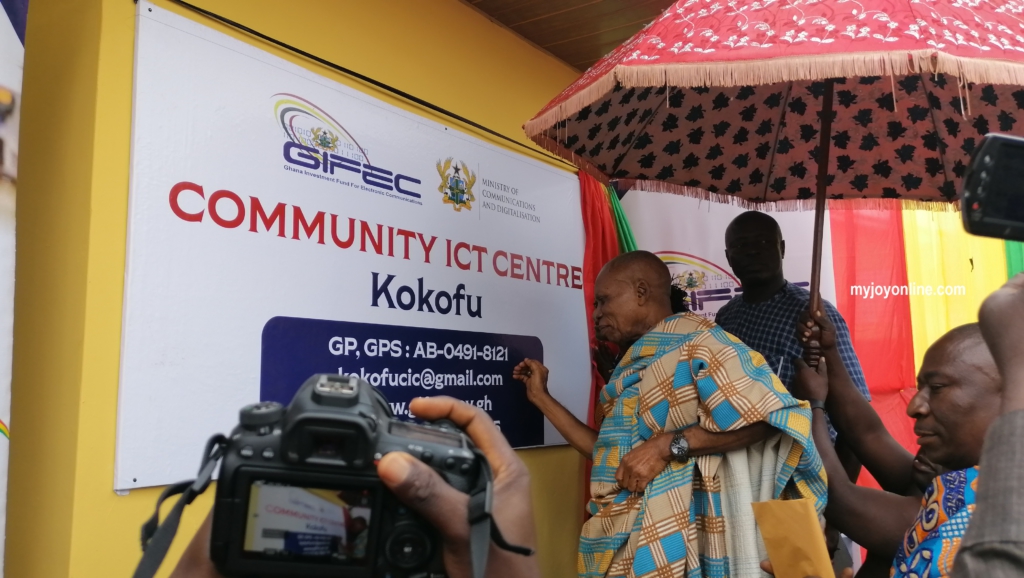At least, two thousand and 16 underserved communities across the country have been connected to voice and data telephony services.
Through its Rural Telephony and Digital Inclusion Project, the Ghana Investment Fund for Electronic Communications (GIFEC) has given hope to communities where hitherto, mobile network operators were unable to extend services to.
Chief Executive of GIFEC, Prince Ofosu Sefah says about 200 million US Dollars is being invested over the period to improve lives in underserved areas.
“GIFEC has had an infusion of investment to the tune of about USD 200 Million.”
He was speaking at the handing over ceremony of a Community ICT Center at Kokofu in the Bekwai Municipality of the Ashanti region.
“Our flagship Rural Connectivity Programme which constitutes our biggest investment, ensures the facilitation and provision of telecommunications infrastructure to communities which are considered unserved or underserved. These are relatively small communities with low economic viability, hence the inability of Mobile Network Operators (MNOs) to extend their services,” he said.
Established in 2004 by the John Agyekum Kuffuor government, the Ghana Investment Fund for Electronic Communications (GIFEC) has provided innovative solutions in access and digital inclusion in some of the remotest parts of Ghana.
It has between 2017 till date focused on infrastructure development, equipment and resource provision and capacity building with the introduction of four life-improvement modules.
Among them is the flagship Rural Connectivity Programme, Cyberlabs and ICT Capacity building and skills development programmes which has brought relief to many.
At least, 5,000 girls and 500 teachers have been trained in ICT in five regions including Ashanti, Western, Central, Oti Regions, Western North and North East Regions.
It has been extended to Bono, Ahafo, Ashanti and Bono East with 1,000 basic and senior high schools also being equipped with computers and accessories to facilitate teaching and learning of ICT.
Prince Ofosu Sefah is the Chief Executive of GIFEC.
“Through the Ghana Rural Telephony and Digital Inclusion Project, 2,016 communities are being connected to voice and data services, to enhance their socioeconomic lives.” Mr. Sefah said.
“We have instituted our ICT Capacity Building and Skills Development Programme, to provide citizens with requisite knowledge and skills to effectively optimise the use of these equipment, and ultimately make them function effectively in the Information and Knowledge Age we are in.
This programme of GIFEC, specifically, imparts ICT skills and knowledge to citizens, including students, artisans, women entrepreneurs, teachers, CIC Managers, etc.” He added.

Deputy Minister of Communication and Digitalisation, Amma Pomaa Boateng says the ongoing ICT drive affirms the significance of government’s digitalisation agenda.
This she says seeks to transform Ghana’s economy of Ghana through the development of robust infrastructure to connect and ensure the inclusion of the citizenry for socioeconomic development.
“We have witnessed first-hand the need to accelerate ICT deployment efforts. Rebuilding and recovering from COVID has been largely driven by technology and innovation.
This, therefore, affirms the significance of government’s digitalisation agenda, which seeks to transform the economy of Ghana through the development of robust infrastructure to connect and ensure the inclusion of every citizen, for socioeconomic development.”
Meanwhile, GIFEC has also introduced ICT Skills for Entrepreneurial Women Empowerment, implemented in partnership with UNESCO to provide basic ICT skills for women entrepreneurs in the informal sector.
With support of local and international funders such as MTN, Vodafone and AirtelTigo, International Telecommunications Union (ITU), United Nations Education, Scientific and Cultural Organization (UNESCO), the German International Corporation (GIZ) and the Norwegian Agency for Development Cooperation (NORAD), GIFEC’s impact is felt across the country.





